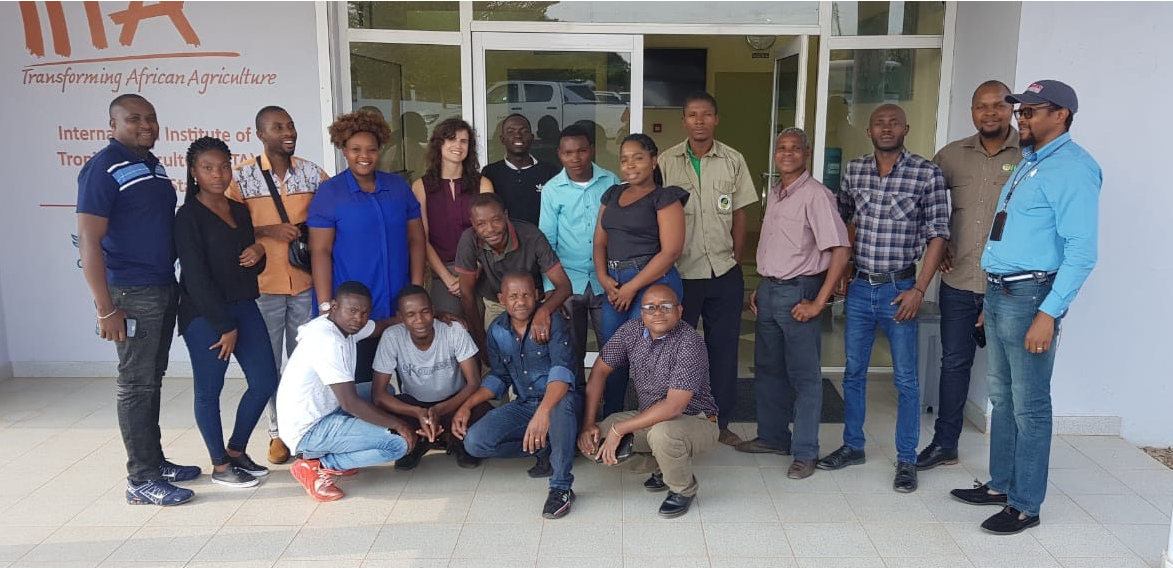Teaching integrated pest management and pesticide safety in Mozambique

Thanks in part to the generous support of the ACES Graduate Student International Research Grant, I was able to visit Mozambique twice during the fall semester to train extension workers and later evaluate their learning retention.
In August 2019, I conducted an Integrated Pest Management (IPM) and Pesticide Safety Training course for 97 extension workers in three districts in north and north-central Mozambique in collaboration with the International Institute for Tropical Agriculture (IITA) and the Mozambique Institute of Agricultural Research (IIAM). Extension workers from Mozambique’s District Services for Economic Activities (SDAE), IITA, IIAM, and several NGOs took part in a two-day training that addressed a variety of topics.
The trainings were conducted in Portuguese in partnership with four trainers from IITA and one trainer from IIAM. The training covered basic IPM practices, such as pest monitoring and crop rotation, as well as critical issues surrounding pesticide safety, including the use of personal protective equipment and interpretation of pesticide labels.
As part of my PhD dissertation research on capacity-building in pesticide safety, I led a session on calculating pesticide application rates and backpack sprayer calibration. Both the control and treatment groups received training on IPM and pesticide safety but treatment groups received an additional refresher module on basic math skills needed for pesticide rate calculation and sprayer calibration. Extension worker knowledge of IPM and pesticide safety was determined before and after the course using identical assessments, which are currently being analyzed.
Although some of the extension workers had received training on IPM and pesticide safety in the past, many had either never received training on these topics or had not received training for several years.
In addition, I met with representatives from three agricultural institutions to discuss incorporating the IPM and pesticide safety training materials created during my last visit into their curricula.
I conducted follow-up interviews with 36 extension workers from the three districts where the trainings were held. The interviews focused on application of the training topics as well as retention of the information presented, primarily pesticide safety and application. I found that 61 percent of the interviewees had informally shared information from the training with colleagues and farmers, while 33 percent had conducted trainings based on one or more of the topics presented during the IPM training in August. All of the interviewees expressed interest in holding trainings related to IPM and pesticide safety once the growing season was underway in February and March.
Knowledge retention related to pesticide safety and application was minimal for many of the interviewees. There did not appear to be a difference in knowledge retention or the ability to correctly calculate pesticide application rates and calibrate spray equipment between the treatment and control groups. This may have been due to the lack of a practical component in the training, as well as the relatively short (two-day) training period. Despite a lack of knowledge on calculating pesticide application rates and calibrating spray equipment, nearly all of the interviewees planned to apply pesticides in the coming growing season. Many of the interviewees claimed to calibrate their equipment prior to spraying but were unable to provide details when asked about the calibration process. This highlights a need for more effective interventions to ensure that extension workers are able to correctly calculate pesticide application rates and calibrate their equipment accordingly.
One way to address the lack of effective training on IPM in general but pesticide safety in particular is to incorporate these critical topics into the curricula for the universities and vocational schools that train agricultural extension workers. Along with representatives from IITA and IIAM, I presented an online version of the IPM and pesticide safety training course to professors at three agricultural schools in Mozambique. Although IPM and pesticide safety topics are already part of the curricula at these institutions, the addition of an online course would allow students to review information outside the classroom, which may help solidify knowledge.
A key challenge for many extension agents is the lack of practical training on IPM and pesticide safety-related topics. While I was unable to provide practical training in August, I plan to return to Mozambique in late 2020 to evaluate the effectiveness of practical training interventions.
Nicole Lee is a PhD student in crop sciences advised by Adam Davis. She received an International Graduate Grant for her project, “Improving extension workers' numeracy skills to enhance the decision-making process for crop protection in Mozambique,” As part of a competitive process, these awards are given to students who require international travel as part of dissertation research, thesis research, or some other significant research project. These awards have been made possible through generous donors including Bill and Mary Lee Dimond, Robert and Barbara Ayre, and the Arlys Conrad Endowment fund.